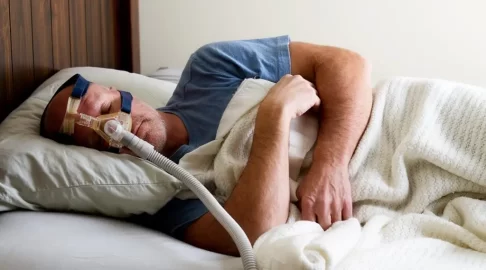Snoring is a common issue that affects millions of people worldwide, but for those with sleep apnea, snoring can be more than just a nuisance—it can significantly impact overall health and quality of life. Loud snoring can aggravate sleep apnea, a disorder marked by disrupted breathing during sleep, therefore upsetting not only the individual’s but also their partner’s sleep. Fortunately, numerous good anti snoring remedies can help sleep apnea sufferers breathe easier, sleep better, and regain restful rest.
Effective Anti-Snoring Solutions for Sleep Apnea Patients
Continuous Positive Airway Pressure (CPAP) Therapy
CPAP therapy is the most often advised course of action for mild to moderate sleep apnea. As the patient sleeps, a CPAP machine continuously streams air through a mask designed to keep the airway open. This helps the airways not to collapse, therefore eliminating snoring and greatly lowering the disruptions in breathing that define sleep apnea.
Mandibular Advancement Devices (MADs)
Mandibular advancement devices (MADs), sometimes called dental appliances, can be a good fix for mild to moderate sleep apnea sufferers. Wearing these custom-fitted gadgets in the mouth, they help to realign the tongue and lower jaw, thereby preventing the collapse of the airways during sleep. Designed to lessen snoring, MADs can be a substitute for those who find CPAP treatment awkward.

Although MADs are good for many, it is advisable to see a healthcare professional to guarantee correct fit and prevent possible adverse effects, such as teeth alignment problems or jaw discomfort.
Positional Therapy
Some sufferers of sleep apnea find snoring and trouble breathing mostly when they sleep on their back. Encouragement of patients to sleep on their side is the basis of positional therapy, which helps to avoid tongue and soft tissue obstructions of the airflow. Maintaining this posture over the night can be helped by particular pillows or equipment meant for side sleeping.
Usually most successful for those with positional obstructive sleep apnea (POSA), this method can be combined with other therapies including CPAP or MADs.
Lifestyle Changes
Many times, lifestyle modifications can greatly lessen snoring and help with sleep apnea. Some such changes include:
Weight Loss:
Particularly in the neck and throat region, extra weight might cause airway restriction. For some sleep apnea sufferers, losing weight might help either completely stop or greatly lessen snoring.
Avoiding Alcohol and Sedatives:
Alcohol and sedative drugs help the throat’s muscles to relax, which increases the likelihood of the airway collapsing while asleep. Reducing or avoiding these drugs will help to stop snoring.
Smoking Cessation:
Smoking aggravates snoring and sleep apnea symptoms by irritating the airways and causing inflammation. Giving up smoking helps to lower snoring and enhances general respiratory condition.
Regular Sleep Patterns:
Keeping a regular sleep schedule could help to improve the quality of sleep and might help to lessen snoring episodes.
For those with sleep apnea, snoring is a disruptive and frequently annoying symptom; yet, there are many therapies available to help solve anti snoring and enhance the quality of sleep. There are many options catered to varied demands and degrees of severity, whether through CPAP therapy, dental appliances, postural alterations, lifestyle modifications, or surgery.





